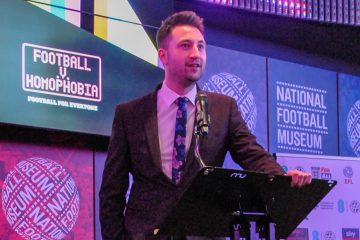‘I’m not just an athlete’: Stacey Francis-Bayman talks authenticity and advocacy on Pride House Podcast

England netball international Stacey Francis-Bayman joins activist and campaigner Khakan Qureshi on Episode 3 of The Pride House Podcast, which focuses on Birmingham; currently with West Coast Fever in Perth, Francis-Bayman talks about using her platform as an athlete who’s LGBTQ+ and the importance of being visible at Birmingham 2022…
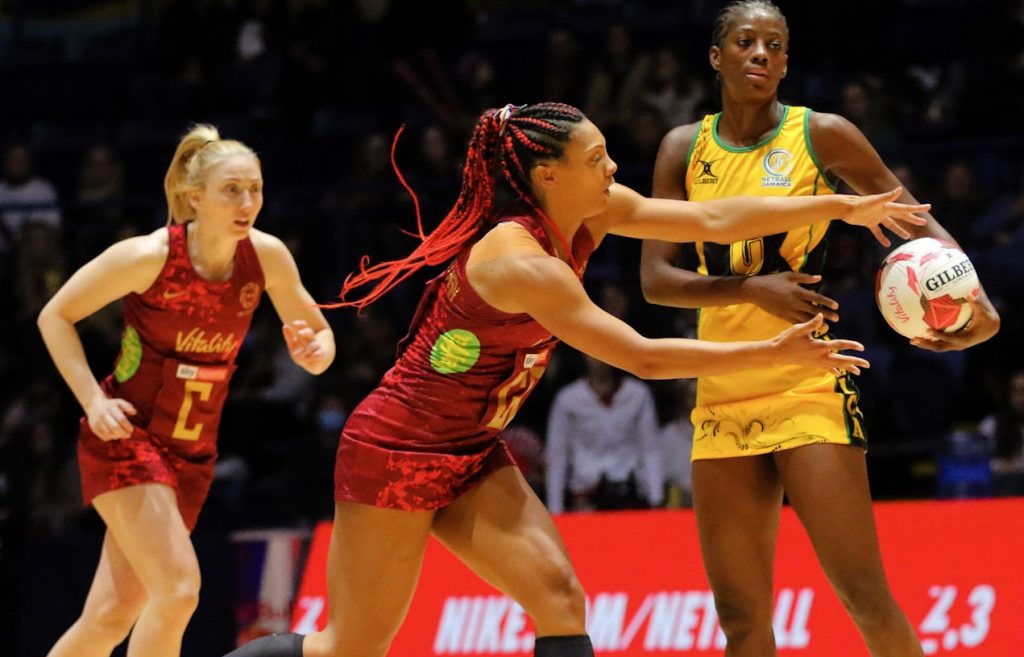
Representing both her country and the city of Birmingham as an athlete playing elite netball in Australia is a source of pride for Stacey Francis-Bayman.
But it’s certainly not all about nationality and being a Brummie for the England international – far from it.
There’s so much more to Stacey, and on the third episode of ‘The Pride House Podcast’ in support of Pride House Birmingham – for whom she is an ambassador – she explains how different parts of her identity combine to give her an authenticity that she hopes will help to power her and her team-mates to Commonwealth Games gold this summer.
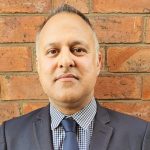
Stacey is joined on the podcast by fellow guest Khakan Qureshi, the founder of the Birmingham South Asians LGBT ‘Finding A Voice’ group who was awarded a British Empire Medal in the 2021 New Year’s Honours List for his dedicated community work on LGBT equality.
It’s a conversation that explores how advocacy can become a passion and the role that a city like Birmingham – famously diverse and multicultural – plays within that.
For Stacey, whose Perth-based West Coast Fever team currently tops the Super Netball league ladder, being true on and off court is something that comes naturally.
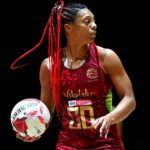
“I don’t think I ever go into any environment within the community specifically to advocate for netball where I censor parts of myself,” she tells host Jon Holmes.
“I’m very mindful of pushing the things that are important to me and what I stand for. That’s being a British person, and being from Birmingham. Although nobody here knew where Birmingham is until the Commonwealth Games got put there!
“So although I can’t push being a Brummie as much, I’m definitely proud to be English, and I’m an import playing in the Australian league, I’m a mixed race woman, I have a black dad and a white mother, I am bisexual, I’m married to my wife Sara, and I love to talk about the two weddings that we had!
“I think there’s a lot that I try to draw from in terms of letting people get to know me and who I am, in the wider context of not just being a West Coast Fever player or an England netballer.
“This is me and who I am, and all of these things have led me to being in this fantastic position and also to be playing netball.”
Stacey’s visibility as an out athlete is a vital factor in not just Pride House Birmingham’s capacity to inspire but the message of welcome that Birmingham 2022 will send out across the Commonwealth, says Khakan.
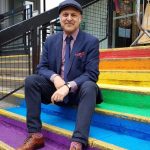
The campaigner says it is role models like the netball star who can connect with young people in particular and demonstrate what a city’s stated commitment to being inclusive can achieve.
“It’s wonderful that we have Stacey who is a woman of colour and who is proudly talking about her identity as well, in the respect that there aren’t that many role models out there,” he says.
“Especially in Birmingham, it’s fantastic that we’ve got somebody who can use their platform to educate people. That’s what I keep saying within the minority groups in particular, with myself coming from a South Asian background, that we do need people to step forward, and talk more about what it means to be part of the LGBTQ+ community.
“It’s also about sharing that narrative and knowing that we are validated. We don’t need to justify who we are – we just are.”
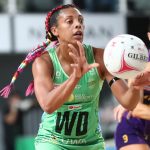
“I’m not just an athlete. You don’t get to just consume who I am by the way in which I throw and catch the ball on court. That isn’t the legacy I want to leave. That isn’t the messaging that I want people to take away.”
— Stacey Francis-Bayman
That recognition of how all the strands of our identity are woven into the fabric of our personalities is something that Stacey embraced in a memorable and personal Pride Month activation last year.
Her rainbow braids caught the eye during the Fever’s win over the Queensland Firebirds and as well as sharing a social post about why she wore them, she also contributed a blog about Pride in her ‘Let’s Be Frank’ series on the team website.
“It was something that I decided on my own,” she explains. “There are a lot of difficulties with getting your whole team or organisation involved in things that you do.
“But what I felt really supported by was everybody’s response and reactions. I wear braids when I play anyway – which are typically green, for the team colours that I play in – but for this game, I had them rainbow.
“The lady that braids my hair is incredible and she braided my hair into a DNA strand, just to really hit home the fact that being bisexual is a part of who I am. It’s not an add-on. It’s just me.
“I felt incredibly confident and comfortable to do that. But I’d love for whole groups and organisations to get on board. That has much more impact rather than individual athletes or advocates having to stick their neck out all the time. It makes the voice and the message much more powerful.
“People I think and hope know who I am and know what I stand for, and I’ll continue to shout about that in the most positive and enthusiastic of ways. But the louder we can shout and the more voices we can have shouting, the better.”
Since recording the podcast episode, the Super Netball match between Stacey’s West Coast Fever side and Sunshine Coast Lightning on Saturday, May 14, has been designated a Pride Match. UK viewers can watch live on Sky Sports Mix from 7.30am BST.
Meanwhile, Khakan is no stranger to standing out from the crowd and in one of the most powerful sections of the podcast, he talks about his upbringing and the challenges he faced, following Stacey’s recollections of growing up in Bromsgrove.
“I’m a child of the 70s and I came through the 80s,” he says. “My coming out experience was a time of Section 28, HIV and AIDS – those were aspects of life that were very much taboo and stigmatised.
“The other side to that is because I come from a Muslim background. We’re educated in our own way, by people like family or those around us, to say that being homosexual in particular is haram or forbidden. That obviously has an impact on the way I’m feeling and trying to navigate myself.
“When I look at Birmingham and how it accepted or didn’t accept at the time the LGBTQ+ community, I think I experienced a lot of internalised homophobia at the time as well. I identified in some ways but I couldn’t really relate to what was going on around me. I think that was down to guilt and shame.”
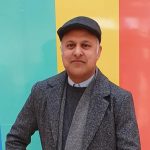
“When we talk about the Commonwealth and LGBT+, we’ve got representation but how far it ripples out is a different matter, in terms of the South Asian diaspora… I hope at these Commonwealth Games, we do have the conversation, whether it’s uncomfortable or not.”
— Khakan Qureshi
He says the “breakthrough” of the city’s Gay Village – where Pride House Birmingham will be located – helped to shift those feelings, but he notes that it’s only more recently that the bars and clubs here have begun to reflect more than one type of LGBTQ+ person.
“It used to be very much dominated by cisgender white males so I felt somewhat left out. It’s only maybe in the last 10 years that Birmingham is beginning to realise that LGBTQ+ individuals come from all walks of life, all different communities and different faiths.
“As a city, I think we need to promote that a lot more than what we have done. We need individuals who are willing to step forward, who do have voices, who are authentic and who can be role models for the next generation.
“I’m hoping that with the Commonwealth Games, Birmingham can reconnect with people of colour in particular. Let’s educate and celebrate who we are.”
Listen now to episode 3 of ‘The Pride House Podcast’ to hear much more from Stacey Francis-Bayman and Khakan Qureshi – and head over to the Pride House Birmingham website for more information about the venue, how to register interest in volunteering, and related events.
Missed episodes 1 and 2 which covered the Pride Houses at Glasgow 2014 and Gold Coast 2018 respectively? Read about them and listen here!
Sports Media LGBT+ is a network, advocacy, and consultancy group that is helping to build a community of LGBTQ+ people and allies in sport. We’re also a digital publisher. Learn more about us here.
We’re interested in your news and stories. Share with us and tap into a worldwide audience through our Google News affiliate website – which pulled in over one million impressions in 2021 – and our popular social channels with over 10,000 followers. Contact us to discuss how we can help you.
